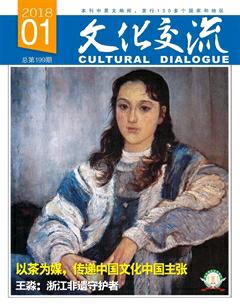我欲騰云上天都
孫國維
中共十九大勝利閉幕后,北京文藝舞臺好戲連臺。繼北京人藝在首都劇場由何冰、宋丹丹、濮存昕、楊立新和徐帆五大主演聯袂登場的京味話劇《窩頭會館》受到熱捧之后,德國交響樂團在中山公園音樂堂奏響了貝多芬作品以紀念他逝世190周年。電視連續劇《急診室醫生》正在熱播,央視網音樂頻道則在現場直播《長相知——中國古典詩詞音樂會》。更吸引眼球的還是在中國美術館舉辦的《“滄海一粟——劉海粟藝術展》。
畫盡神州尤愛黃山奇景
這次展覽共展出101幅大師的書畫作品。涉及多種題材和風格,是近年來劉海粟作品難得一見的全面回顧。展覽共分三個篇章:(一)“我欲騰云上天都”。展出28幅黃山作品。其中,11幅是油畫,17幅是潑墨潑彩;(二)“今日荷花別樣紅”。包括34幅以花鳥山水為主的中國畫和2幅書法;(三)“神州盡在彩霧中”包括中國各地風景的37幅油畫。
劉海粟對黃山情有獨鐘。一生中最重要的作品也以黃山為主要題材。他一生曾經十上黃山,成為旅游和美術界的美談。他愛黃山成癖。他描述黃山為“天下絕秀”:千峰萬嶂,干云直上,不傲不附,如矢如林,幽深險怪,詭奇百變。他的代表作就是《黃山云海奇觀》和《披著狐皮的姑娘》,后者是他的第三任妻子。可見他愛黃山如同嬌妻。1982年,他第九次上黃山,作詩歌頌黃山道:“黃山七十有二峰,峰峰削出青芙蓉,天風海濤曲未終,澗泉鳴樹風鳴松。”劉海粟與黃山之緣跨度長達70年之久。從寫意到創造,從“昔我師黃山”到“今做黃山友”。畫家與表現對象由神遇而跡化,成為不分你我的整體。
傳奇經歷鑄就藝壇大師
展覽特意介紹了海翁的生平及其傳奇經歷。他姓劉名海粟,字季芳,號海翁。別署靜遠老人,存天閣主。生于1896年3月16日,祖籍江蘇常州,卒于1994年8月7日,屬于跨世紀老人。他的藝術遺產十分豐富,人生閱歷尤其可貴。他是我國上個世紀涌現的“百年巨匠”中極負盛名的畫家和美術教育家。1912年創辦上海圖畫美術院(后改為上海美術專科學校),1949年任南京藝術學院院長。早年學油畫,風格倉古渾雄,兼學國畫,線條有剛勁鐵骨之力。后又潛心于潑墨畫法,走筆龍蛇,彩墨縱橫,在美術界樹一代新風。曾擔綱上海藝術家協會主席和中國美術家協會顧問。
1914年,年僅19歲的劉海粟在他創辦上海美專破天荒地開設了人體寫生課,起初雇用男模特,后來啟用女模特,輿論大嘩。1917年,舉辦上海美專成就展覽會,公開陳列人體模特作品,某女校校長竟破口大罵劉海粟是“藝術叛徒”、“教育界的蟊賊”。一石激起千層浪,自此,劉海粟不得安寧。許多美術界同行有的給予同情和支持,有的與其分道揚鑣。軍閥孫傳芳自己三妻四妾,生活糜爛,對于海翁的藝術革新和創見卻斥之為大逆不道。他一邊聲討,一邊下令通緝,揚言要焚燒美專,氣勢洶洶,大有泰山壓頂之勢。海翁不得不暫避風頭,出國游歷。
1918年劉海粟到北京大學講學,并舉辦他第一次個人畫展,獲得廣泛好評。其中,蔡元培和郭沫若的贊許和鼓勵使他信心倍增。第二年他東渡日本,參加帝國美術院開幕大典,并和日本畫家藤島武二等交游論藝,切磋畫技。《朝日新聞》為他在東京舉辦畫展。海翁的繪畫藝術受到日本同行的贊許,他被推崇為“東方藝壇的雄獅”。回國后,他充實了畫院的設備和課程。并著有《米勒傳》和《塞尚傳》,向國內美術界介紹西方畫壇的藝術經驗和成就。1929年海翁赴歐洲訪問,考察游歷法國、意大利和瑞士等國。3年內創作了近百幅油畫作品。曾兩次入選法國秋季沙龍,獲得法國美術界好評。他曾與畢加索、馬蒂斯等畫壇大伽交游論藝。巴黎大學教授路易·拉羅拉撰文稱贊他為“中國文藝復興大師”。1930年欣逢比利時獨立紀念,海翁應聘為美術館平陳委員。他的作品《九溪十八澗》獲得榮譽獎。當年,《海粟油畫》出版。
img src="http://img1.qikan.com.cn/qkimages/whjl/whjl201801/whjl20180106-2-l.jpg" alt="" />
1938年春,劉海粟回到上海,應上海商務印書館之約,寫成80萬字的《海粟叢書》,共分6卷出版。畫論精辟,廣為流傳。從1931年到1949年,他的大部分時間都在國外游歷考察。中華人民共和國成立后曾任華東藝術專科學院院長和南京藝術學院院長等職。1981年應聘為意大利國家藝術學院院士,并被授予金質獎章。
先行一步融合中西文化
正是劉海粟的包容和博大的胸襟,鑄就了他獨樹一幟的表現主義藝術,從而實現了中西互補和對立統一。使他成為上世紀初中國現代美術的啟蒙者和解放者,又不愧是我國現代美術教育史上最堅定的反封建先鋒。由于他敢于打破陳規陋習,是我國美術界走出國門的先行者,所以是他最早吸收西方的先進藝術理論和實踐,并把他們引進了中國。他終身都以本心面對世界,孜孜不倦地創新,因此,他的作品中較為明顯地融合了西方后印象派、野獸派畫家和中國寫意美術的美學風格。他先行一步探索東西方文化對接,進而成為中國畫壇的領軍人物。在篳路藍縷的歷程中,劉海粟披荊斬棘,一往無前,以蓬勃的才情,軒昂的斗志和豐碩的成果,把可能變為現實,從而譜寫了中國現代美術運動初創階段的華彩樂章,為世人所傳頌。
Liu Haisu Art
Exhibition in Beijing
By Sun Guowei, our special reporter in Beijing
From November 3 to 26, Liu Haisu Art Exhibition was held at the National Art Museum of China in Beijing. Liu Haisu (1896-1994) was a landmark artist and art educator of the 20th-century China. The event featured 101 artworks of painting and calligraphy by the artist. It was a rare and comprehensive review of the artists career and artistic achievement. The exhibition was divided into three sections. The first part displayed 28 works about Yellow Mountain, a scenic attraction in Anhui Province. Eleven were oil paintings and 17 were in the traditional Chinese style, characterized by splashes of color and ink. In the second part were 34 landscape and bird-flower paintings and 2 works of calligraphy. The third part featured 37 landscapes highlighting the nations best known scenic scenes.endprint
Liu was a gifted artist. In 1912, the 17-year-old young artist founded Shanghai Institute of Fine Art with his two friends. In 1914, the 19-year-old art educator boldly launched an unprecedented figure drawing course at the school. At first, only male models were employed. Then female models also appeared in classrooms. The media coverage was sensational. In 1917, at an art exhibition in Shanghai featuring the works of the students of the school, some nude paintings were displayed. These nude paintings flabbergasted the whole nation. Conservatives blasted the nude paintings. A schoolmaster of an all-girl school dismissed Liu as “the traitor of the arts”. Sun Chuanfang, a warlord, threatened to burn down the art school and order an arrest of Liu Haisu. Liu went overseas to avoid further trouble.
The turning point appeared in 1918 when he was engaged to give lectures at Beijing University and held his first solo exhibition in Beijing. In 1919, he studied in Japan and held an exhibition in Tokyo. After returning to China, he provided teaching devices and enriched the curricula at the institute. He wrote two books introducing Jean-Francois Millet and Paul Cezanne to Chinese readers. From the 1930s to 1949, he spent a lot of time traveling overseas. In Europe, he painted and presented his oil paintings and made friends with masters. After the founding of the Peoples Republic of China in 1949, he served as president of East China Institute of Fine Arts and Nanjing Academy of Arts.
In the history of modern Chinese art, Liu Haisu is recognized as the founder of a distinct system of art education. Three other major art education systems are respectively named after their founders: Xu Beihong, Lin Fengmian and Pang Xunqin. Liu is now widely considered as a pioneer and liberator of Chinese modern art in the early decades of the last century. He is also considered as a combatant fighting the outdated stereotypes and traditions of the past. Liu was the first Chinese who introduced western art concepts and practices into China. In his career, Liu embraced the world and never ceased to be creative. His artworks integrate the impressionism and fauvism of the west and the Chinese freehand aesthetics. By exploring the integration of the western and the eastern culture, he became a pioneering artist in the history of modern Chinese art.
The first part of the exhibition in November focused upon Yellow Mountain in Anhui. Liu Haisu had a special passion for the scenic peaks, which some consider are the most scenic in China. In about 70 years of his life of 98 years, Liu toured the mountain ten times. In his younger years, he considered the mountain as his mentor about the landscape beauty. He explored the grotesque shapes and forms of the towering peaks and wondered how he could portray them in his paintings. As years elapsed and he matured, he then considered the Yellow Mountain as his friends. While painting the Yellow Mountain, he thought he was painting himself into these marvelous peaks.endprint

